Lock replacement costs vary across regions due to several key factors. First, labor rates tend to be higher in urban areas, where demand and cost of living climb. Material availability plays a role as well; local supply chains can lower prices, while reliance on distant suppliers often inflates them. Competition among locksmiths also affects pricing—more competition usually means better rates. Finally, local regulations and licensing requirements can lead to higher costs for compliant locksmiths. Understanding these elements gives you a clearer picture of what influences lock replacement prices in your area. Discover even more insights into this topic.
Key Takeaways
- Urban areas generally have higher locksmith rates due to increased demand and operational costs associated with a higher cost of living.
- Local supply chain robustness influences lock replacement costs, with better availability leading to lower prices and quicker service.
- Competition among locksmiths in a region affects pricing; more competition typically results in lower rates and improved service quality.
- Local regulations and licensing requirements can raise costs, as licensed locksmiths incur additional training, insurance, and compliance expenses.
- Variations in regional crime rates can impact lock replacement costs, with higher crime areas demanding more robust security solutions and driving up prices.
Labor Rates and Costs
When it comes to lock replacement, understanding labor rates and costs is essential for budgeting the project effectively. You're not just replacing a lock; you're ensuring the safety of a space.
Recognizing that lock replacement costs can vary notably based on region will help you plan better. For instance, urban areas often see higher regional locksmith rates due to increased demand and operational costs. Additionally, factors such as the complexity of the lock and the type of service required can also influence costs, making it vital to do your homework when seeking services in your area.
Understanding lock replacement costs can provide you with a clearer picture of what to expect.
In contrast, rural locations might offer lower rates, but availability may affect your options. It's important to research the lock replacement cost by region, as this will directly influence your overall budget.
You should also consider location-based lock pricing. Some areas may have a higher concentration of locksmiths, creating more competition and potentially driving prices down. Conversely, in less populated regions, fewer locksmiths may lead to inflated costs.
Material Availability and Sourcing
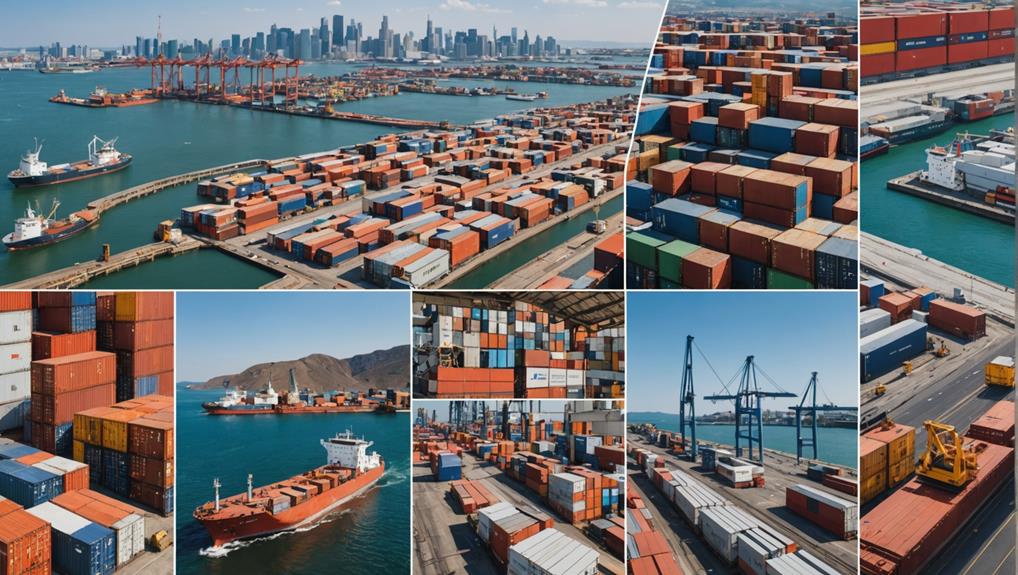
When replacing locks, you need to contemplate where the materials are sourced from and how readily available they are.
Factors such as local demand and the presence of suppliers can also influence costs considerably. Local supply chains can greatly impact your costs and timelines, so it's wise to check what's nearby.
Additionally, transportation costs can add up, especially if materials have to be shipped from far away.
Understanding lock replacement costs can help you make informed decisions.
Local Supply Chains
Understanding local supply chains is essential for determining lock replacement costs, as material availability and sourcing directly impact pricing and project timelines. When you consider the cost of locks in different areas, you'll notice that regional lock pricing can fluctuate considerably. This variation often stems from how easily materials are sourced locally.
For instance, if a region has a robust supply chain for lock materials, you might find lower prices and quicker service from locksmiths. Conversely, in areas where sourcing materials is more challenging, you could face higher locksmith cost variation, leading to increased overall expenses.
You should also consider the implications of sourcing materials. If a locksmith relies on distant suppliers, not only can this drive up costs, but it can also slow down project timelines.
Transportation Costs
Transportation costs play an essential role in determining lock replacement expenses, as they directly affect material availability and sourcing. When you're looking to replace a lock, understanding these costs can help you better serve your clients and community.
If materials need to be shipped from distant suppliers, the added transportation fees can drive up lock prices considerably. In regions with limited local suppliers, you might find that sourcing materials is more challenging. This often means higher shipping costs, which contribute to why lock prices vary across different areas.
For instance, if a locksmith regularly orders locks from a supplier hundreds of miles away, you'll likely see those transportation expenses reflected in their pricing. Conversely, when you're in a region with a thriving local supply chain, you can benefit from reduced transportation costs.
This can lead to more competitive pricing for lock replacements, enabling you to offer better service to your clients. By understanding these dynamics, you can make informed decisions and help your customers find the best options available while keeping costs manageable.
Regional Economic Factors
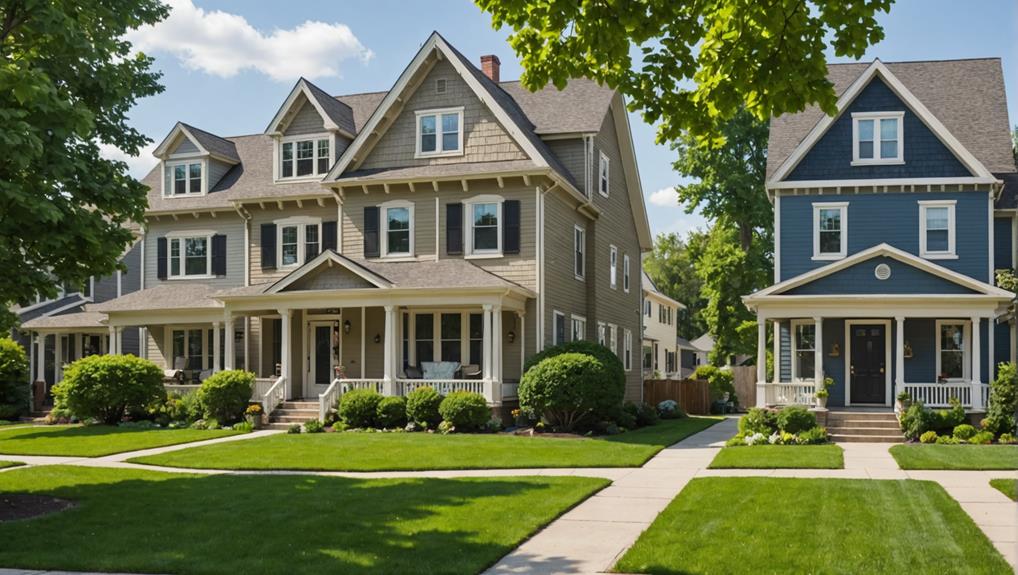
Regional economic factors play an essential role in determining lock replacement costs, as local market conditions and labor availability directly influence pricing.
In addition to these factors, it's vital to reflect on the specific services provided by locksmiths, which can also vary widely in price based on local competition and demand for specialized services such as understanding the costs of professional lock replacement.
When you reflect on these factors, it's clear that the community's economic landscape affects how much you might pay for a locksmith's services. Here are some aspects to keep in mind:
- Cost of Living: In areas with a higher cost of living, locksmith services tend to be pricier due to increased overhead expenses.
- Labor Market: If you're in a region with a shortage of skilled labor, locksmiths can charge more due to their limited availability.
- Economic Stability: Regions experiencing economic growth often see a rise in service prices, including locksmith costs, to accommodate higher demand.
- Local Demand: Areas with higher crime rates may have more frequent lock replacements, driving prices up as locksmiths respond to increased demand.
Understanding these regional economic factors can help you make informed decisions when it comes to lock replacements.
You'll not only serve your own needs but also appreciate the broader economic influences at play in your community.
Competition Among Local Locksmiths
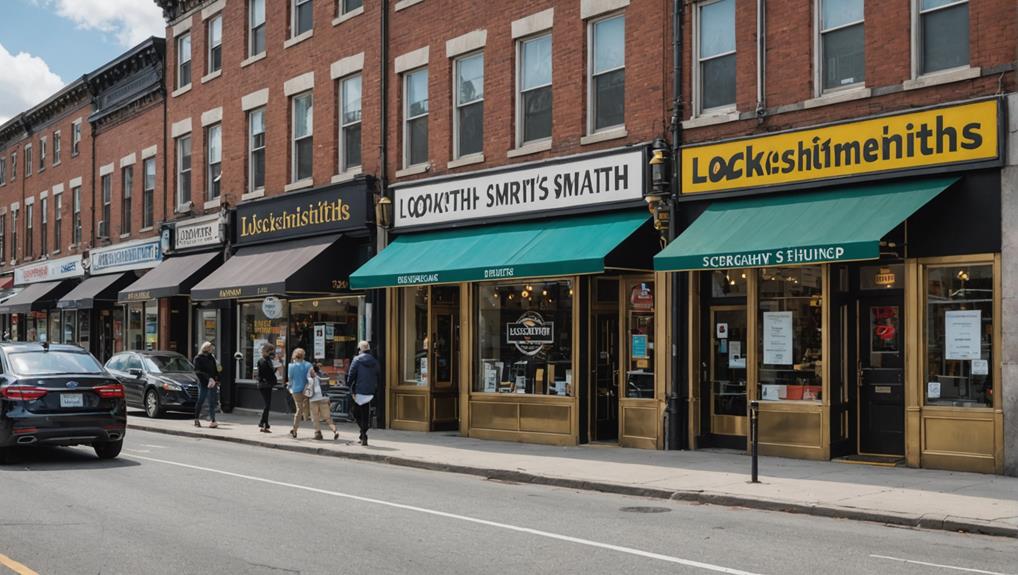
Often, competition among local locksmiths greatly influences pricing and service quality. When multiple locksmiths operate in your area, you're likely to see more competitive rates and improved service offerings. This competition encourages locksmiths to enhance their skills and provide better customer experiences, knowing that satisfied clients are more likely to recommend them.
Take a look at the table below to see how competition can affect various aspects of locksmith services:
| Aspect | High Competition | Low Competition |
|---|---|---|
| Pricing | Lower average rates | Higher average rates |
| Service Variety | More options available | Limited options available |
| Response Time | Quicker service | Slower service |
In regions with high competition, locksmiths often invest in marketing and promotions to attract clients, which can lead to better deals for you. Additionally, they may offer various services, such as emergency lockouts or advanced security solutions, to stand out. Ultimately, knowing your local market helps you make informed decisions and guarantees you receive quality service at a fair price.
Local Regulations and Licensing
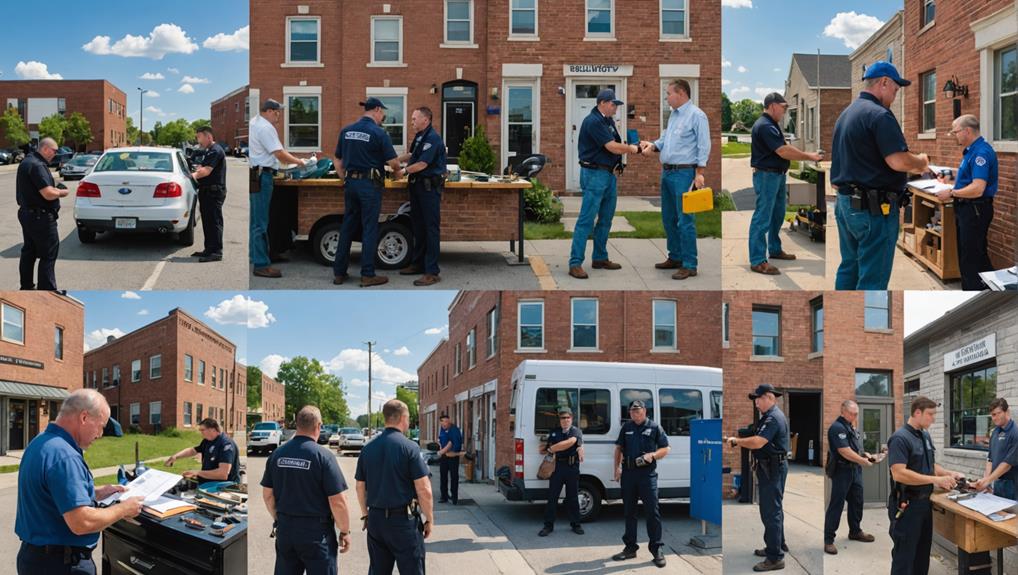
When you're considering lock replacement, local regulations and licensing can greatly impact your costs.
Different areas may have specific codes, standards, and certification requirements for locksmiths, influencing both the pricing and quality of services provided. Understanding these factors is essential to guarantee you're compliant and protected from potential liabilities, as outlined in the local regulations and standards.
Each region has its own requirements, which can lead to variations in pricing and service quality.
It's vital to understand these factors to guarantee you're compliant and protected from potential liabilities.
Licensing Requirements Impact Costs
How do local regulations and licensing requirements affect lock replacement costs? Understanding these factors can help you navigate the expenses associated with lock replacement.
When you hire a locksmith, their licensing status can notably influence their pricing. In many areas, locksmiths need to hold specific licenses to operate legally, which can lead to higher costs for you.
Here are some ways licensing requirements impact costs:
- Training and Certification: Licensed locksmiths often undergo rigorous training, leading to increased service fees.
- Insurance and Bonding: Many licensed locksmiths carry insurance, which protects you but may also elevate their prices.
- Regulatory Compliance: Adhering to local regulations can require additional investments from locksmiths, which are often passed on to you.
- Reputation and Trust: Licensed professionals generally build a trustworthy reputation, giving you peace of mind but sometimes charging a premium for their services.
Regional Regulation Differences
Regional regulations on locksmithing can vary considerably from one area to another, impacting both the hiring process and costs. In some regions, locksmiths must obtain specific licenses or certifications, while others may have fewer requirements.
If you're looking to hire a locksmith, it's essential to be aware of these local regulations, as they can influence the level of expertise and professionalism you encounter.
In areas with stringent regulations, locksmiths often invest more time and money into their training and licensing. This commitment can lead to higher service costs, but it also means you're likely hiring someone who adheres to strict industry standards.
Conversely, in regions with minimal regulations, you might find lower costs, but there's a risk of hiring someone without the necessary skills or accountability.
Understanding these regional differences helps you make informed decisions when selecting a locksmith. It guarantees you're investing in quality service that aligns with your safety and security needs.
When you prioritize hiring a qualified professional, you're not just saving money; you're safeguarding your home or business and supporting the importance of skilled craftsmanship in your community.
Compliance and Liability Factors
Compliance with local regulations is essential for locksmiths, as it directly impacts both their liability and the quality of service you can expect.
When locksmiths adhere to these rules, it not only protects them but also guarantees you receive reliable service. Understanding these compliance factors helps you make informed choices when selecting a locksmith.
Here are some key aspects of local regulations and licensing:
- Licensing Requirements: Many regions require locksmiths to obtain specific licenses, guaranteeing they've met professional standards.
- Insurance Coverage: Licensed locksmiths often carry liability insurance, which protects you from potential damages during service.
- Background Checks: Regulations may mandate background checks for locksmiths, giving you peace of mind about who's entering your property.
- Service Standards: Compliance often includes guidelines on service quality, guaranteeing locksmiths maintain a high level of professionalism.
Geographic Demand Variances
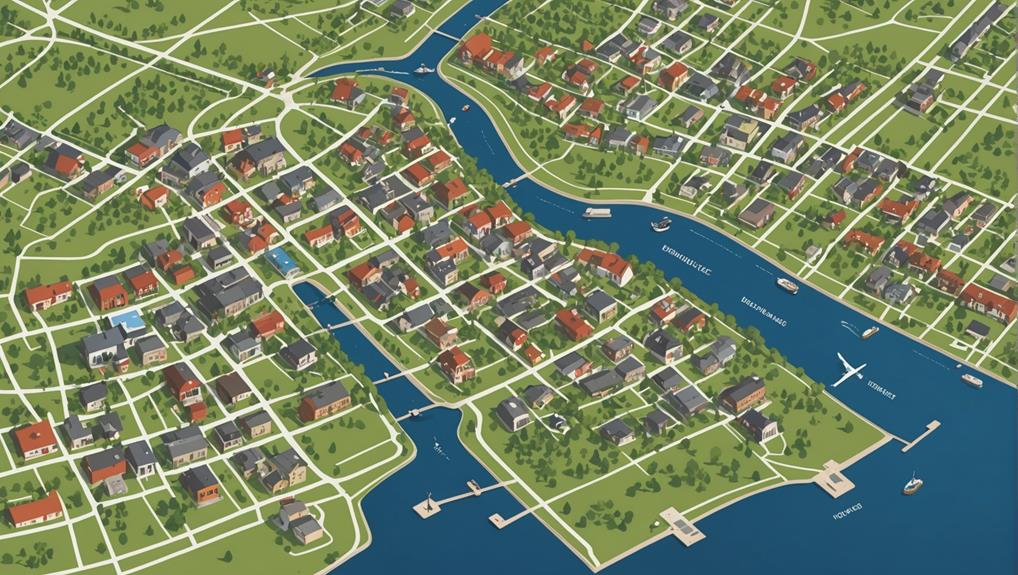
Lock replacement costs can vary markedly based on geographic demand, influenced by factors like local crime rates and the prevalence of specific lock types.
If you're in an area with high crime rates, you might notice that the demand for robust security solutions drives prices up, as many homeowners opt for enhanced security measures to protect their properties. In contrast, a region with lower crime may not see the same urgency, which can keep costs lower.
Additionally, certain locks might be more common in specific areas due to regional preferences or building styles.
If a particular type of lock is widely used in your community, you might find more locksmiths familiar with that model, which can lead to competitive pricing. In contrast, if you need a specialized lock in a less common style, expect to pay more due to limited availability and expertise.
Understanding these geographic demand variances can help you make informed decisions when it comes to lock replacement.
You'll not only save money but also guarantee that you're choosing the best security option for your needs. By being aware of your local market, you can serve your community effectively, helping others secure their homes and businesses.
Frequently Asked Questions
How Can I Find a Reliable Locksmith in My Area?
To find a reliable locksmith in your area, start by asking friends or family for recommendations.
You can also search online for local locksmiths with positive reviews.
Check their websites for credentials and services offered.
Don't forget to look for customer testimonials to gauge their reliability.
Once you've narrowed it down, call a few to discuss your needs and get quotes.
You'll feel more confident choosing the right one for your situation!
What Types of Locks Are Most Commonly Replaced?
When you're considering lock replacements, the most commonly replaced types include deadbolts, knob locks, and smart locks.
Deadbolts offer added security and durability, while knob locks are popular for interior doors. Smart locks are gaining traction for their convenience and keyless entry features.
If you're helping others, educating them about these options can enhance their security and peace of mind.
Always make sure to choose quality locks that meet safety standards for maximum protection.
Are DIY Lock Replacements Cost-Effective?
DIY lock replacements can be cost-effective if you've got the right tools and skills. You save on labor costs and can choose a lock that fits your budget.
However, if you're not confident in your abilities, it might lead to mistakes that could compromise security. Remember, a well-installed lock is essential for safety.
Weigh the costs and your experience before diving in; sometimes, hiring a professional is worth it.
How Often Should I Replace My Locks?
You should replace your locks every 5 to 7 years, or sooner if they show signs of wear.
If you've moved into a new home, it's smart to change them right away for security.
Also, consider replacing locks after a break-in or if you lose your keys.
Regular checks can help you spot any issues before they become serious.
Keeping your locks in top shape guarantees the safety of those you care for.
Do Smart Locks Have Different Replacement Costs?
Smart locks typically have different replacement costs compared to traditional locks.
You'll find that smart locks often come with advanced features, which can raise the price due to technology and installation complexity.
If you're considering upgrading, it's wise to budget for both the lock itself and any additional installation fees.
Researching various models can help you find one that fits your needs without breaking the bank while serving your security requirements effectively.
Conclusion
To sum up, understanding why lock replacement costs vary across regions helps you make informed decisions. You might think it's just about the lock itself, but factors like local labor rates, material availability, and competition really drive prices. Imagine this: two cities, one with high demand and fewer locksmiths, and another buzzing with options. The first city's costs soar, while the second stays competitive. So, next time you need a lock replaced, remember the bigger picture!










